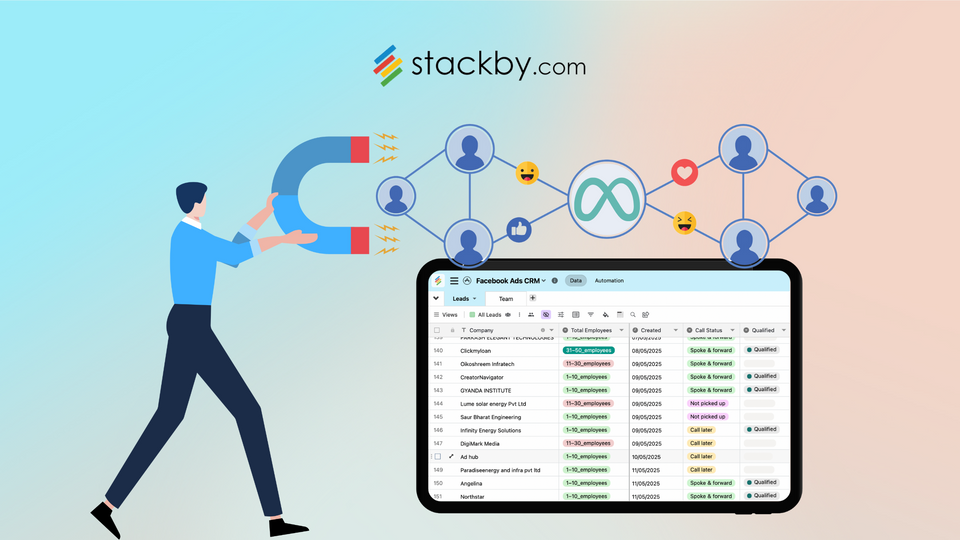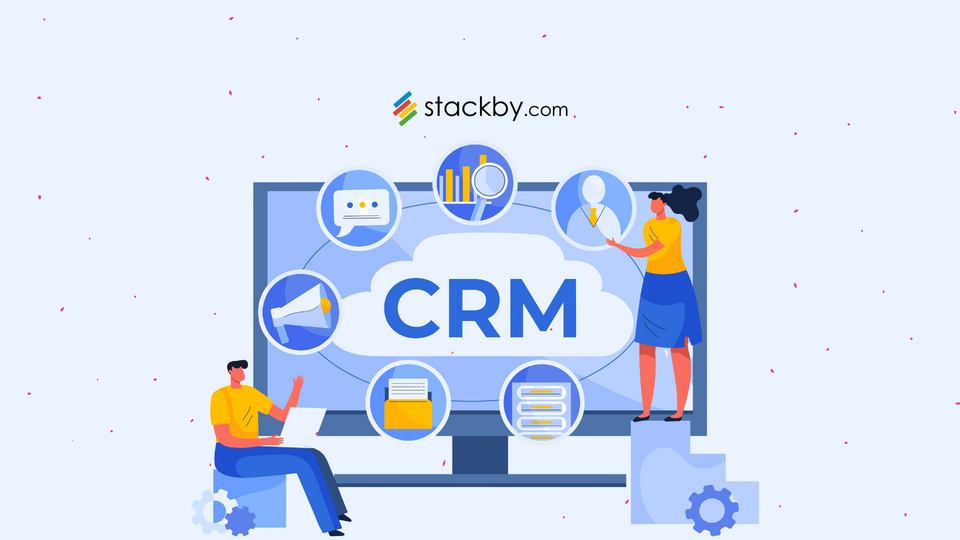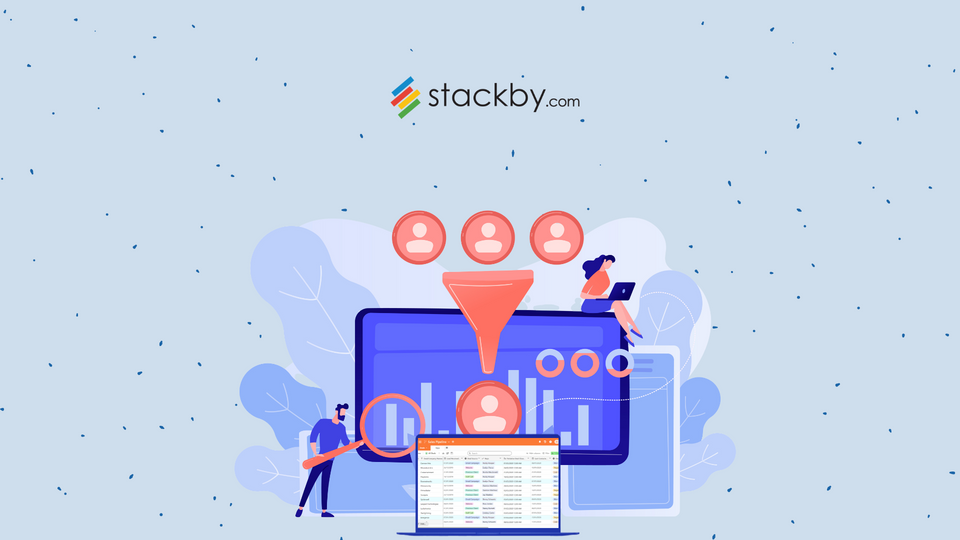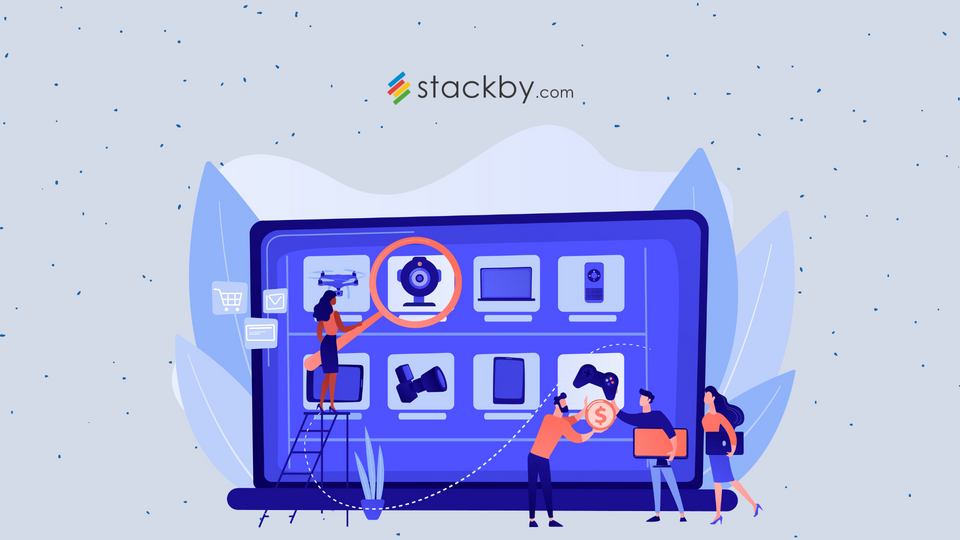Top 11 B2B Sales CRM Software for 2026 (Free & Paid Options)
Looking for the best B2B CRM for your sales team? Explore our top 10 picks for 2026, including both free and premium tools designed to streamline your sales pipeline and help you convert leads faster.

B2B sales today look nothing like they did five years ago. Buyers now are more informed, sales take longer to close and decision-making is shared across multiple people, sometimes even across departments. And honestly, it’s only going to get more complicated in future.
You might sit through five meetings before hearing a single "yes"
So how does a CRM fit into all this?
It’s no longer just a nice-to-have. It makes the difference between closing deals and watching leads disappear into thin air.
A solid B2B CRM does more than keep a list of contacts. It helps you handle long, complex buyer journeys, track every conversation, follow-up, or hand-off, and turn scattered touchpoints into one smooth path.
Grand View Research predicts the global CRM market size is expected to reach $163.16 billion by 2030, growing steadily every year. That says a lot. CRMs are here to stay. They’re evolving, and B2B teams need to evolve with them.
What Is a B2B CRM?
A B2B CRM (Customer Relationship Management) system helps businesses handle relationships with other businesses, their clients, suppliers, partners, or leads. In a B2B setup, you don't just sell to an individual, you engage with an entire organization.
This involves multiple people, various roles, and layered conversations. A single deal might require reaching out to a marketing manager, negotiation with a procurement head, and getting the final approval from a finance team.
It's not just one-off transactions, but initiating long-term partnerships, building trust over time, and staying relevant across every stage of the buyer’s journey. From initial outreach to final onboarding, a B2B CRM helps you manage every interaction and keep track of every crucial detail.
What makes a B2B CRM different from a B2C one?
In a B2B context, you're not selling a pair of sneakers to an individual customer with a single click, but rather managing a business relationship potentially involving multiple calls, demos, discussions, contracts, and approvals from multiple departments.
B2B CRMs are designed for those long, layered sales cycles. They help you qualify leads, visualize every stage of the pipeline, deal with complex account hierarchies, and communicate smoothly across different roles.
Unlike B2C (business-to-consumer), which may focus on high volume and speed to conversion, you may be nurturing towards a six-month deal requiring sign-off from the head of legal, finance, and operations (all stakeholders that will need to approve the final decision). A B2B CRM provides you with the tools to make sure you can stay on top of every part of that journey.
B2B CRMs often demand deeper customization and more robust integrations than B2C CRMs, whether it be a document signing platform, or billing systems.
B2B CRMs also tend to have a stronger lead-tracking mechanism, as you typically manage fewer leads, but much more complexity. Communication and support tools are also critical, to keep multiple stakeholders aligned throughout the buying cycle.
And personalization isn’t just a “nice to have” option, it is essential because you are customizing outreach not for one buyer, but rather an organization with multiple roles and needs.
Core Features B2B CRMs need:
- Lead management: Capturing and qualifying incoming leads. Tracking where the leads are coming from and how ready they are to buy.
- Pipeline tracking: Visualizing every stage of the sales process and seeing where each deal stands.
- Account-based marketing (ABM): Personalizing outreach to organizations, not to individual people.
- Customer insights: Collecting and analyzing all the touchpoints to improve follow-ups and timing.
If you’re taking selling to other businesses seriously at all, you can’t skip any of these.
Benefits of B2B CRM
A good CRM does more than just organize your data. It becomes your second brain, especially in the complex world of B2B relationships where every interaction counts.
- Personalization:
In B2B, every business you work with has unique needs and roles. A CRM helps cater to every touchpoint, from emails to demos, based on full context, past conversations, and decision-maker preferences.
- Improved customer relationships:
Consistency is key when you’re dealing with multiple stakeholders across departments. A CRM ensures follow-ups are on time, conversations are tracked, and no message is missed.
- Streamlined processes:
B2B sales aren’t linear. From lead capture and qualification to onboarding and after-sales support, a CRM keeps the process structured so nothing falls through the cracks.
- Data-driven decisions:
From identifying your best lead sources to figuring out where deals stall, the right CRM gives you insight to refine your strategies and act faster.
- Better sales outcomes:
When your pipeline is clean and your team is aligned with clear data, deals close quicker, and with less back-and-forth.
Top B2B CRM Tools in 2025
Let’s look at who’s doing what in the B2B CRM space. This isn’t about which one is the best. It’s about what fits your team, your workflows, and your budget.
1. Stackby CRM
Stackby is like building your own CRM without touching a single line of code. It's user friendly interface feels like a spreadsheet, but with way more muscle.
For B2B teams juggling longer sales cycles, multiple decision-makers, and constantly changing processes, Stackby steps in with structure and flexibility. It combines the familiarity of rows and columns with the depth of a relational database. And because it’s fully customizable, you can tailor it to fit exactly how your team works, not the other way around.
Best for: SMBs to large teams looking to customize their CRM without going enterprise-level in cost or complexity.
500+ Customizable Templates: Start with pre built CRM templates and shape them to fit your exact pipeline stages, lead types, or client segments
Automation: Set up internal triggers like status change or new records to automate updates.
Or you can connect to 3,000+ external apps via Zapier, Integromat (Make), and Stackby’s own integrations.
Real-time collaboration: Activity bar, commenting, reminders, checklists, and view sharing, it’s built for teams working across sales, marketing, and support.
Apps Marketplace: Add dynamic views like pivot tables, charts, summaries, or even stack schema to analyze your data and get instant insights.
Power-ups: Choose from over 30 power-ups (and growing). For B2B use cases, this includes button columns that trigger email sequences, or signature-type fields for approvals.
This is a CRM that grows with you. One you can keep tweaking as your business scales and your processes evolve.
2. Salesforce
Salesforce is the veteran in the room, trusted by enterprises for its depth and scalability. As a B2B CRM, it’s built to handle complex sales ecosystems with ease. Its enterprise-grade customizations make it ideal for businesses looking to deeply integrate their sales processes across departments.
Best for: Large enterprises that need complex workflows and have the budget and resources to manage them.
Key features:
- AI-powered insights for smarter forecasting with Einstein AI.
- Deep integrations across platforms and departments.
- Custom dashboards for detailed performance tracking.
3. Pipedrive
Sales-first: that’s the whole vibe of Pipedrive. It’s built for deal-focused teams who want a clean, intuitive interface and visual sales pipelines. In a B2B setup, it helps teams move deals through complex funnels with fewer clicks and clearer visibility. Using an alternative to Pipedrive is more affordable and easier.
Best for: Sales teams that want a no-fuss CRM that’s easy to adopt.
Key features:
- Visual deal tracking.
- Workflow automation with AI capabilities.
- Simple reporting and insights.
4. Nutshell
Often flying under the radar, Nutshell is a surprisingly solid choice. It aims to simplify the CRM experience by making it more accessible for small teams without compromising on the core features that matter in a B2B setup.
Best for: Small businesses who want a single tool for everything.
Key features:
- Unified contact management.
- Sales automation.
- Built-in email marketing tools.
5. Freshsales (by Freshworks)
Freshsales feels modern and unified. It brings together calls, emails, and CRM data into a single platform and makes it easier for sales teams to track communication, manage contacts, and stay aligned without switching tools.
Best for: Teams looking to manage communication and pipeline from one place.
Key features:
- AI-based lead scoring with Freddy AI.
- Customizable automation.
- Sales sequences and follow-ups.
7. ActiveCampaign
ActiveCampaign is more than just a CRM, it's a full-fledged marketing automation platform. Along with managing sales and customer relationships, it empowers businesses to run email campaigns, create automated workflows, and engage with customers across their entire lifecycle. Its perfect for B2B teams that want to align marketing and sales from one platform.
Best for: Businesses that prioritize engagement and lifecycle marketing.
Key features:
- Advanced email automation.
- Workflow builders.
- Smart customer segmentation.
8. HubSpot CRM
HubSpot CRM is a great entry point for teams new to CRMs. It offers a user-friendly interface and a free plan, making it accessible for startups and small businesses to explore CRM capabilities without much difficulty.
Best for: Startups or teams trying out CRM for the first time.
Key features:
- Contact and deal tracking.
- Email tracking.
- Syncs well with HubSpot's marketing tools.
9. Zoho CRM
Zoho brings a well-rounded offering to the table. From sales automation to analytics and multichannel communication, it covers all essential CRM functions in one platform.
Best for: Businesses that want scale, but without Salesforce-level complexity.
Key features:
- Multichannel engagement.
- Automation and macros.
- Built-in analytics.
10. Copper CRM
Specifically designed for teams using Google Workspace, Copper CRM integrates directly into Gmail, so your contacts, emails, and tasks live right where you already work. This integration is especially useful for B2B teams that rely heavily on email communication to manage long sales cycles and multi-person decision processes.
Best for: Teams already living in Google Drive, Docs, Calendar, and Gmail.
Key features:
- One-click data capture from emails.
- Calendar and task sync.
11. Monday CRM
Monday CRM is built on top of the flexible Monday.com work platform, giving you the power to set up your CRM as per your business needs. From managing pipelines to automating follow-ups, it adapts to your team’s workflow which becomes especially helpful in a B2B environment.
Best for: Teams who love visual dashboards and control over workflows.
Key features:
- Customizable pipelines tailored to sales processes.
- AI-powered automation to streamline workflows.
- Advanced team collaboration tools for seamless communication.
Comparative Analysis
Pricing: Stackby, HubSpot, and Zoho offer affordable plans for small businesses. Salesforce and ActiveCampaign lean higher, especially as features grow.
Ease of Use: Pipedrive, Nutshell, and HubSpot are beginner-friendly. Salesforce and Zoho need more setup.
Customization: Stackby and Monday CRM shine here. You can build exactly what you need.
Integration: Salesforce and ActiveCampaign offer the deepest integrations. Copper’s great for Google Suite users. Stackby has built-in API support + apps.
Support & Community: HubSpot has extensive documentation. Salesforce has a large community. Stackby offers human support with documentation, chat, and tutorials.
Choosing the Right B2B CRM for Your Business
There’s no single best CRM. What works for one company may feel like overkill for another.
Start with what you need. Is it simple lead tracking? Or detailed pipeline analytics? Are you a 5-person team or 50?
Also think long-term. Will this CRM grow with you? Or will you outgrow it in a year?
Try the free trials. Play around. Get your team’s feedback. Don’t just pick what’s popular, pick what fits.
Final Thoughts
The right B2B CRM isn’t just software, it’s a system that supports how your team works.
It helps you stay on top of every conversation, deal, and task. It gives you clarity, direction, and consistency.
If you're just starting out, tools like Stackby give you the freedom to build your CRM your way. Flexible, scalable, and affordable, without losing depth.
It’s 2025. There’s no one-size-fits-all. But there is a CRM that fits you.




